Possibilities – Volume 1, Issue 2
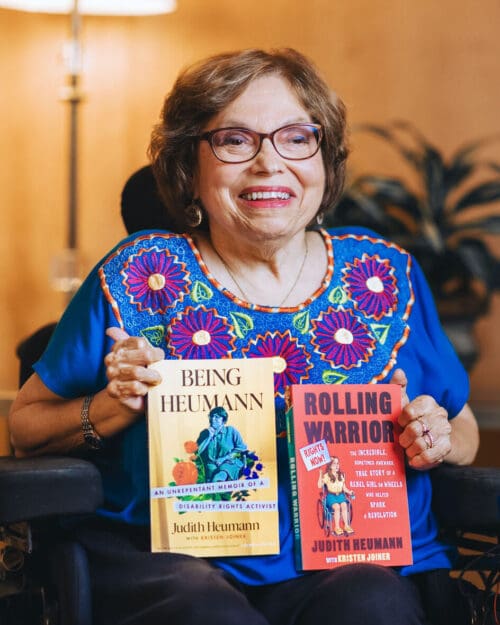
Volume 1, Issue 2 – Summer 2023
PNW Accessibility Center
Success starts with Access
Welcome to the PAC’s second issue of Possibilities. Possibilities highlights students, faculty, and staff that help make PNW an accessible and inclusive environment for all.
Volume 1, Issue 2 includes the following stories:
- The PAC is Now in the Pride
- Help Wanted: Dyslexic Thinking Skills Needed
- Yesterday’s Warriors, Today’s Scholars, Tomorrow’s Thinkers
- “Mother of the Disabilities Movement” Keynote Speaker at PNW Seminar
- 2022-2023 PAC Stats
The PAC is Now in the Pride
Big News!
The DAC will now be known as…the PNW Accessibility Center.
The PAC will continue to offer the same support to students with medical, mental health, physical, and learning concerns, but the new name is more encompassing and offers a more reflective description of all of the students who are served.
“No matter the situation, though, the mission of the PNW Accessibility Center remains the same: to provide equal access and equal opportunity for students' PNW experience.”
“There are students in many different situations who use the PNW Accessibility Center,” says PAC Director Debra Wysong. “Some students have long-term conditions such as diabetes, a learning disability or PTSD, while other students need accommodations in the short term for things like concussions, an injured hand, or pregnancy.
“No matter the situation, though, the mission of the PNW Accessibility Center remains the same: to provide equal access and equal opportunity for students’ PNW experience.”
Help Wanted: Dyslexic Thinking Skills Needed
Did you know that dyslexic thinking is a vital employment skill that LinkedIn users can now add to their profile? This new skill set appeared on the platform in March 2022, and was the result of a campaign by Made By Dyslexia in partnership with Sir Richard Branson, entrepreneur and business magnate.
“Dyslexic thinking skills like creativity, problem-solving and leadership are vital to the 21st century workplace,” writes Kate Griggs, author, speaker, and dyslexic thinking expert. “When we reach a 50-50 work split between machines and humans, as predicted for 2025 – the skills humans will need are dyslexic thinking skills. Now is the time for dyslexics to stand out, rather than blend in – and share their sought-after skills with organizations who are actively recruiting for them.”
You can read Griggs’ full article on LinkedIn.
Yesterday’s Warriors, Today’s Scholars, Tomorrow’s Leaders
Smith decided to finish his undergraduate work at Purdue Northwest, and began here in the Fall of 2019. What stood out for Smith at PNW were the smaller class sizes and the university’s reputation with other veterans. “It was clear that PNW had a very supportive and strong veteran community,” he said.
Smith began his studies in earnest, but realized that something wasn’t clicking in his PNW classes. “I was struggling not because I didn’t know the material,” he said. “But because I was running out of time” when taking exams. He was being distracted by the students around him.
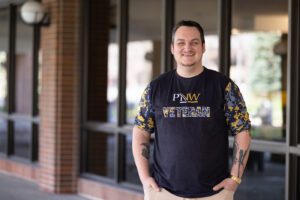 One of the first things military personnel learn in boot camp is to be keenly aware of one’s environment at all times, according to Anthony Pilota, Veteran Services Coordinator in PNW’s Office of Veteran Services. Hyper alertness is a crucial skill to develop in the military, but it can be a hindrance in a classroom of students taking a test. Smith, who was diagnosed with dyslexia in middle school, was struggling to redirect his sharp observation skills to better focus on exams, but wasn’t having much success. Smith shared this experience with other veterans in the university’s Vet Services Office, and a fellow engineering student there advised him to connect with the PAC.
One of the first things military personnel learn in boot camp is to be keenly aware of one’s environment at all times, according to Anthony Pilota, Veteran Services Coordinator in PNW’s Office of Veteran Services. Hyper alertness is a crucial skill to develop in the military, but it can be a hindrance in a classroom of students taking a test. Smith, who was diagnosed with dyslexia in middle school, was struggling to redirect his sharp observation skills to better focus on exams, but wasn’t having much success. Smith shared this experience with other veterans in the university’s Vet Services Office, and a fellow engineering student there advised him to connect with the PAC.
It took some prodding, but Smith eventually did reach out to the PAC and the accommodation for Smith to take exams in a private room in the PAC was put into place. “I needed to learn to accept the fact that I needed some help,” he said. “Now I feel 100 percent more comfortable focusing on exams,” adding that his GPA has increased from a 2.71 to a 3.61 since working with the PAC.
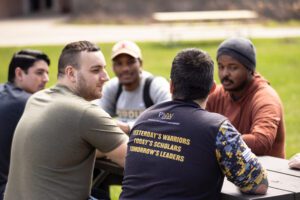
Pilota, himself a Marine vet, says Smith’s success story is just one of numerous found in the partnership between the university’s Veteran Services and the PAC. In addition to making the monumental transition from military to civilian life, veterans also can be dealing with the impact of injuries like traumatic brain injuries, Post Traumatic Stress Syndrome, and mobility problems. PAC accommodations to address these obstacles can include giving students classroom seating options such as sitting in the back row with no one behind them, and extended time on exams, as well as lending students Smart Pens which assist the student with notetaking. Academic coaching within the PAC is also an important component of access for some students. PAC’s academic coaching teaches students how to compensate for skills they may be lacking due to disability. This may include weekly meetings with students to improve their executive function skills, teaching effective study and test-taking strategies and many other skills that are based on the students’ individual needs.
“I needed to learn to accept the fact that I needed some help, now I feel 100 percent more comfortable focusing on exams.”
 Pilota’s advice to any veteran in college is to approach graduating with a degree as a mission, and to learn that asking for support and help is not a weakness. The combination of finding peer support in Veterans Services, and accommodations through the PAC is “the best way to achieve your academic goals.” he said.
Pilota’s advice to any veteran in college is to approach graduating with a degree as a mission, and to learn that asking for support and help is not a weakness. The combination of finding peer support in Veterans Services, and accommodations through the PAC is “the best way to achieve your academic goals.” he said.
(*) Mark Smith is a pseudonym for a PAC student whose identity is protected under the Family Educational Rights and Privacy Act (FERPA).
“Mother of the Disabilities Movement” Keynote Speaker at PNW Seminar
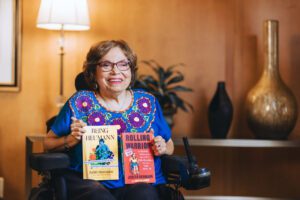 Participants throughout the world attended PNW’s Global Collective seminar this past Feb. 21, which featured Judy Heumann, known as the “mother of the disabilities movement,” as keynote speaker. Sadly, Judy passed away shortly thereafter on March 4 in Washington D.C. where she lived with her husband.
Participants throughout the world attended PNW’s Global Collective seminar this past Feb. 21, which featured Judy Heumann, known as the “mother of the disabilities movement,” as keynote speaker. Sadly, Judy passed away shortly thereafter on March 4 in Washington D.C. where she lived with her husband.
The Global Collective Action Seminar, a brainchild of the PNW Center for Global Studies, aims to eliminate barriers to access of some of the latest thinking on positive social change, and creates a space where these important conversations can occur. Judy’s words, based on a lifetime of experiences made for a meaningful presentation and illustrated how it wasn’t that long ago that individuals with disabilities were not afforded basic rights.
Judy’s activism was seminal in the development of significant milestones in the civil rights movement for people with disabilities.
Born in 1947 in Philadelphia, Judy became paralyzed at 18 months after contracting polio. This was at a time when many in the medical profession, including Judy’s doctor, recommended institutionalization. Judy’s parents thought differently and she was raised at home, but this was only the beginning of her struggle against the established norm. She and her parents had to fight for her to attend grade school, as the school considered Judy’s wheelchair a fire hazard and refused to allow her to attend school. Her parents fought for many years before she was finally allowed to attend public school. As a young adult, Judy won a lawsuit against New York City school’s for refusing to hire her as a teacher, also because of her wheelchair.
Judy’s activism was seminal in the development of significant milestones in the civil rights movement for people with disabilities. She was a leader in the historic 28-day sit-in in San Francisco in 1977 which led to enactment of the Section 504 of the Rehabilitation Act, which requires federally funded entities to accommodate people with disabilities. Her work was also crucial to the creation of other important laws such as the Individuals with Disabilities Education Act (IDEA) which requires schools to educate students with disabilities (instead of denying them access), the Americans with Disabilities Act (often referred to as the ADA) which requires all public places to provide accommodations to people with disabilities, and the UN Convention on the Rights of Persons with Disabilities. Judy worked in top positions in the Clinton and Obama administrations and later served as an advisor to the World Bank and the Ford Foundation. She also was an author, and podcast producer.
2022-2023 PAC STATS
Quick Stats
- Did you know…The PAC proctored 1,010 accommodated exams in Fall ’22, and 878 in Spring ’23? That’s a 44% increase from Fall ’17, and a 53% increase from Spring ’17.
- The PAC completed 230 intakes in the ’22-’23 academic year. From Fall ’16 to Fall ’21, intakes increased 409%.
- The PAC held 706 Academic Coaching sessions in ’22-’23. That’s a 94% increase from the previous academic year.
- Did you know…The PAC fielded over interactions with PNW students, faculty, and staff in the ’22-’23 academic year?
Percentage of PNW Students the PAC Serves

According to the National Center for Education Statistics, 19%-26% of college students have disabilities. The PAC has increased service from 1.5% to just over 6% of the PNW student body.
This represents a 313% increase in students served by the PNW Accessibility Center.
Percentage of PAC Students in PNW Courses ’22-’23 Academic Year
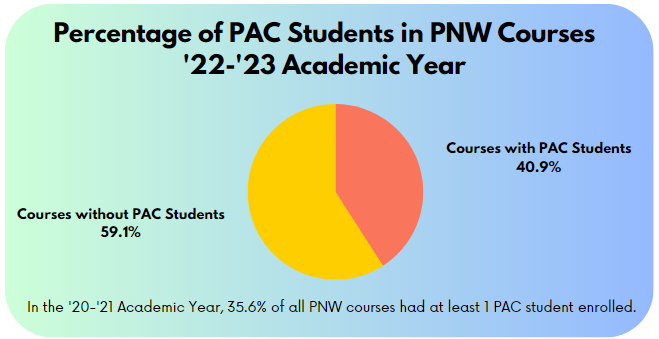
In the 2022-2023 academic year, 40.9% of courses has at least one PAC student attending that course. In the 2020-2021 Academic Year, 35.6% of all PNW courses had at least 1 PAC student enrolled.